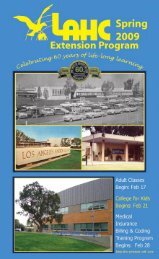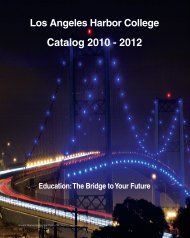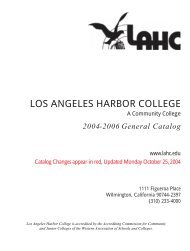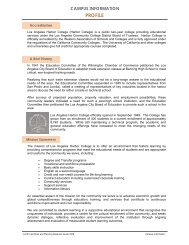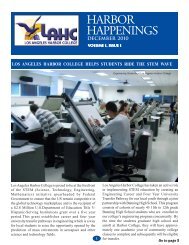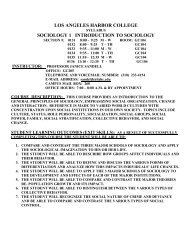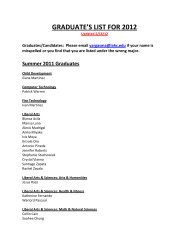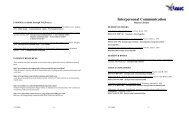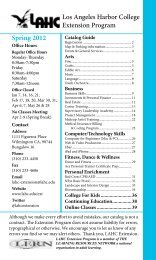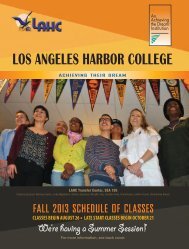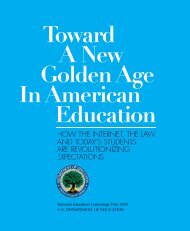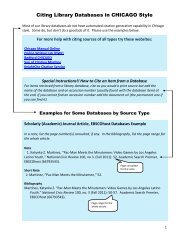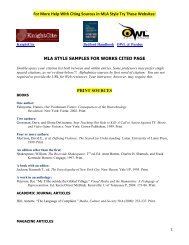Download File - Los Angeles Harbor College
Download File - Los Angeles Harbor College
Download File - Los Angeles Harbor College
Create successful ePaper yourself
Turn your PDF publications into a flip-book with our unique Google optimized e-Paper software.
parallel circuits. Selected topics include, laboratory test<br />
equipment care and application, laboratory procedures and<br />
report preparation, component identification, interpretation<br />
of equipment specifications, technical problem solving<br />
techniques. Lecture is complemented with a 3-hour<br />
laboratory session whereby; experiments are utilized to<br />
reinforce lecture topics and concepts.<br />
22 - ELECTRONIC CIRCUITS II (4 UNITS) CSU<br />
Prerequisite: Completion of Electronics 006 with a grade of “C” or<br />
better.<br />
This course covers (through lecture, discussion, and<br />
laboratory) semiconductor devices and their application<br />
to linear circuits; including heat sink theory and<br />
evaluation, and the analysis of rectifier and amplifier<br />
circuits (including H-Parameters). Methods of testing and<br />
troubleshooting these devices are evaluated using standard<br />
lab test equipment, (curve tracers, LCR bridge, x-y plotter<br />
and AC voltmeters). In addition, technical report writing is<br />
emphasized on concepts learned through experimentation.<br />
41 - MEASUREMENTS AND TESTING<br />
LABORATORY I (1 UNIT) RPT 3<br />
Corequisite: Concurrent enrollment in any Electronics or Computer<br />
Technology laboratory course.<br />
This course provides 3 hours of lab use for students that<br />
need or desire additional laboratory time. Students can<br />
work ahead of the class on their individual lab assignments<br />
or perform additional experimentation on their individual<br />
projects. Students that enroll will have access to the lab and<br />
all necessary test equipment, as well as consultations with<br />
an instructor. This class is given on a credit/no credit basis.<br />
43 - MEASUREMENTS AND TESTING<br />
LABORATORY II (1 UNIT) RPT 3<br />
This course is for students who want to independently<br />
investigate, test and evaluate electronic projects that they<br />
propose. Students present their project proposals to an<br />
instructor for approval. Upon approval, students will have<br />
access to the laboratory and test equipment to complete<br />
their project.<br />
50 - ADVANCE SOLID STATE CIRCUITS (4 UNITS)<br />
CSU<br />
Prerequisite: Completion of Electronics 007 and Electronics 022 with<br />
grades of “C” or better.<br />
This course concerns the linear design and application<br />
(power supply regulation, low frequency amplifiers,<br />
power amplifiers, comparators and active filters) of<br />
transistor and integrated circuit devices in the related<br />
fields of computers, communications, and radar. This<br />
is a discussion/demonstration course with emphasis on<br />
application methods of design. A series of projects from the<br />
indicated applications are assigned as laboratory projects.<br />
In addition, technical report writing, emphasizing design<br />
and data evaluation is an integral part of the course.<br />
54 - COMPUTER LOGIC (4 UNITS) CSU<br />
Recommended: Completion of Electronics 004 and Electronics 020<br />
with grades of “C” or better.<br />
This course covers the basic theory and application of logic<br />
circuitry as applied in digital computers. Boolean algebra,<br />
number systems, coding and decoding, truth tables, logic<br />
maps, basic logic gates, combinational logic circuits, flip/<br />
flops, arithmetic circuits, counters, registers, and concepts<br />
of storage devices are thoroughly discussed. The use<br />
of a digital trainer is used to reinforce these concepts<br />
and applications. In addition, technical report writing is<br />
emphasized.<br />
56 - COMPUTER CIRCUITS (3 UNITS) CSU<br />
Prerequisite: Completion of Electronics 054 with a grade of “C” or<br />
better.<br />
Corequisite: Concurrent enrollment in Electronics 057.<br />
This course covers the operation and organization of digital<br />
computers and micro-processors, including addressing,<br />
access, 1/0 (D-A and A-D) internal synchronization.<br />
Other storage devices (solid state) and logic control<br />
circuits are covered. The concepts of logic-design are<br />
used in the evaluation of these circuits. Operational<br />
computers and microprocessors are used to evaluate these<br />
circuits in a system. An introduction to machine language<br />
programming is also included.<br />
57 - COMPUTER CIRCUITS LABORATORY<br />
(1 UNIT) CSU<br />
Corequisite: Concurrent enrollment in Electronics 056.<br />
This course provides evaluation of digital computer circuits<br />
through the use of computer and microprocessor trainers.<br />
Stored program concepts are covered using machine<br />
language programming to develop software diagnostics.<br />
The analysis of fault locations in computer circuits is also<br />
covered. In addition technical report writing, emphasizing<br />
data evaluation, is an integral part of the course.<br />
60 - MICROWAVE FUNDAMENTALS (3 UNITS)<br />
CSU<br />
Prerequisite: Completion of Electronics 016 with a grade of “C” or<br />
better.<br />
This course introduces microwave fundamentals and<br />
evaluations of antennas, transmission lines, wave-guides,<br />
antenna radiation patterns, and Smith charting techniques<br />
are studied in this course.<br />
2012-2014 General Catalog Course Descriptions * 133



